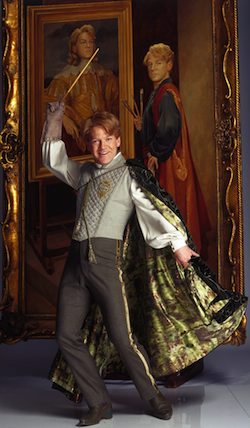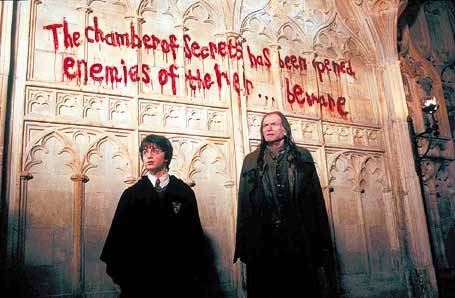Harry Potter and the Chamber of Secrets is very much of a piece with its predecessor. The books were similarly a pair, with the first balancing the “more of the same” demands of commercialism with a necessary broadening of the created universe. Where the book Chamber of Secrets succeeds in crafting a compelling narrative—Hogwarts under attack by the previously mythical Heir of Slytherin . . . who might be Harry!—and ultimately becoming, if not the strongest book in the series, certainly not the weakest, the movie contents itself with dutiful, almost grim, recitation. It stretches two hours of story out over two and a half hours of running time through truly shameful cinematic execution.
Told more concisely on-screen, Chamber of Secrets would be an excellent suspense movie, though the book’s narrative energy is largely squandered by the poorly staged, timidly edited action. Like in Philosopher’s/Sorcerer’s Stone, nearly every shot is held at least a full second longer than necessary, although director Chris Columbus has daringly included two extreme close-ups (in a scene between Harry and Dumbledore; they each get one) to break up the perfect string of medium close-ups that constitute the entire rest of his two Potter movies.
The clunkiness of the direction isn’t restricted to film nerd nitpickery. Take this scene toward the beginning: Harry, the Weasley family, and Hermione are in the bookstore and gigantic twit Gilderoy Lockhart (Kenneth Branagh, who really is quite good in the role) makes a big deal over Harry being there for a photo op. When the jealous Draco Malfoy confronts them, it’s as if the scene takes place on a stage, with the actors arbitrarily walking to a particular point in the room to deliver their lines. It makes no cinematic sense, and no sense of any kind other than to satisfy fans of the books who are thinking first “Ah, the scene where Draco jealously confronts Harry that leads into the introduction of Lucius Malfoy” rather than “how did someone who was getting paid to direct this movie by a major Hollywood studio get away with blocking this scene this badly without being fired?” Not to mention that, rather than the highly satisfying fistfight between Lucius Malfoy and Arthur Weasley, the scene ends with the elder Malfoy snootily swishing his cape and gliding off-screen.
 Jason Isaacs as Lucius Malfoy is great fun. He imbues the role with a glorious nastiness that is at once silky and oily, and starts the tradition of each new Potter movie adding one or more British acting all-star to the ensemble. The other worthy making his Harry debut, Branagh, is an example of fairly inspired casting; I freely admit to a degree of initial disappointment that a more tabloid-y, celebrity-type actor wasn’t cast, and I also now freely admit that my impulse was the wrong one. Branagh is infinitely better as the preening, narcissistic fraud Lockhart than someone like Hugh Grant could have been in a million years.
Jason Isaacs as Lucius Malfoy is great fun. He imbues the role with a glorious nastiness that is at once silky and oily, and starts the tradition of each new Potter movie adding one or more British acting all-star to the ensemble. The other worthy making his Harry debut, Branagh, is an example of fairly inspired casting; I freely admit to a degree of initial disappointment that a more tabloid-y, celebrity-type actor wasn’t cast, and I also now freely admit that my impulse was the wrong one. Branagh is infinitely better as the preening, narcissistic fraud Lockhart than someone like Hugh Grant could have been in a million years.
The returning cast are mostly good as well. Alan Rickman’s Severus Snape is so good, it’s hard not to make every review entirely about his line readings and the way he cocks his eyebrow in that one scene. Some others fall victim to Columbus’ haphazard direction, particularly the kids, who aren’t as prepared as classically-trained veterans to create an entire performance out of thin air. Multiple times, Dan Radcliffe’s Harry leads Ron and Hermione to the middle of a room, stops, and shouts dialogue at them. This isn’t bad acting, it’s a director not having his actors’ back, as well as an example of the director caring more about slavishly recapitulating the events in the source book than about making an actual movie.
Ultimately, where the first movie’s script (copied, for the most part, directly from the novel) lent a sense of wonder and discovery of a new world that smoothed over its cinematic flaws, Chamber of Secrets stumbles badly on those flaws. And, like the tiny handful of changes in the adaptation, Chamber of Secrets’ are jarring. At the end of the movie, after Harry tricks Lucius Malfoy into freeing the house-elf Dobby (who, after reading Deathly Hallows, will never be annoying again, in another welcome improvement this rewatch), Malfoy pere is so enraged that he pulls his wand and actually gets out the “Avada” in Avada Kedavra before Dobby intervenes with house-elf magic. Obviously, after all my criticisms of Columbus (and screenwriter Steve Kloves) for excessive, blind fidelity to the source material, I’m not getting on him for adding something new. But having Lucius Malfoy, a character defined by the care he takes to never get caught doing anything bad and whose continued existence outside of prison is entirely due to that care, attempt to murder Harry Potter about ten feet from Dumbledore’s office in Hogwarts is an unforgivably thoughtless misstep. One might as well have Hermione reply “LOL IDK” in Charms class.
Primarily because this horrible oversight takes place right at the end of the movie, the overall feeling at the end of Chamber of Secrets is that it’s terribly overlong and redundant. I can only speculate what the experience of it is for someone who hasn’t read the book, but for me it just reminded me that I had, and that the book could have been made into a much better movie if making it into a movie had been a priority. Instead, we got Lucius Malfoy coming within an inch of murdering Harry in Hogwarts, and this among the countless missteps in execution based on the assumption that the audience has read the books already. However true that may be, one can never make that assumption in an adaptation.
Chamber of Secrets is still watchable, amazingly, due to J.K. Rowling’s story and the immense skill of the actors and designers. Beyond that, it’s not much of a mystery why this was Chris Columbus’ last movie as director in the series. And when Warner Bros decided a change was in order, they certainly had a big one in mind. Next: Prisoner of Azkaban, and new director Alfonso Cuarón!
Danny Bowes is a playwright, filmmaker and blogger. He is also a contributor to nytheatre.com and Premiere.com.










